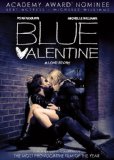| Reviews & Columns |
|
Reviews DVD TV on DVD Blu-ray 4K UHD International DVDs In Theaters Reviews by Studio Video Games Features Collector Series DVDs Easter Egg Database Interviews DVD Talk Radio Feature Articles Columns Anime Talk DVD Savant Horror DVDs The M.O.D. Squad Art House HD Talk Silent DVD
|
DVD Talk Forum |
|
|
| Resources |
|
DVD Price Search Customer Service #'s RCE Info Links |
|
Columns
|
|
|
Blue Valentine
Starz / Anchor Bay // R // May 10, 2011
List Price: $29.98 [Buy now and save at Amazon]
The Film:
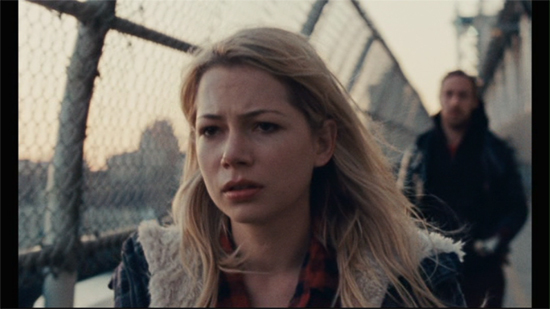
There's the urge to start a discussion about Blue Valentine by saying, "Everybody's gone through a soul-crushing end to a relationship". For some, Derek Cianfrance's deeply-felt indie drama will be a mirror; it's not likely to directly embody a real-life situation, but the framework and frank dialogue won't hesitate in striking a familiar chord with those who've fought similar battles and endured similar pains. Yet everybody hasn't crawled tooth-and-nail through a relationship like the one depicted here, where a change in mannerisms seemingly has no origin point, and the unhappy languor grinding between them becomes unbearable. It's honest, hard to watch, and seemingly futile as they spin their emotional tires, yet when you witness the memories built underneath them with convincing organic joy, you understand why it's not a useless battle -- and, in tandem, why it also is.
The script, written by Cianfranc, Cami Delavigne, and Joey Curtis, depicts a modern-day couple who have assuredly seen better days. It first focuses on a run-down version of Dean (Gosling), an easily-agitated housepainter who adores his daughter, Frankie. Then, our vision moves to his wife Cindy, the more responsible and mature of the two. She's a nurse at a local fertility clinic who appears exhausted and in full-on "mother" mode, while harboring off-put feelings towards her unmotivated, alcohol-fueled husband that don't make themselves readily apparent -- at least, not to him. Their demeanors immediately make us wonder what they might've seen in each other, in another time and another place, and how these two people got to a browbeaten state, populated with cold shoulders, questioning glances, and an utter lack of passion.
Blue Valentine answers that curiosity, in an artful and deeply-provocative fashion. It concurrently tells the story of how Dean, once a creative and musically-inclined professional mover, and Cindy, an edgy and sharp-tongued med-school student, meet by happenstance and fall in love at first sight -- at least, in Dean's case. But before it reaches this point, it also paints a portrait of the lives that these younger versions of the couple muscled through to get there, showing Dean's struggle with inexperience and a lack of high-school education, as well as Cindy's toils with a verbally-abusive father and a halfhearted relationship with a brutish sex-driven wrestler at her school. These moments merge with their modern-era frustrations and conflicts in a meaningful fashion, focusing closely on the way that their mannerisms have changed -- and stayed the same -- since their first real date.
While the writing could've easily guided Blue Valentine towards melodramatic exertion, it simply doesn't go in that direction. The material here depicts a weathered couple who've been slowly dragged into the state of discontent that accompanies eking out a void make-it-work life, with Dean and Cindy suffering in their own ways. The depiction has a specific awareness of the adult psyche, giving the film a punchy, aching feeling amid their arguments -- one in particular over an ex-lover Cindy bumps into at a liquor store. Director Cinafranc thoroughly comprehends the emotional nature of adults, both in the self-conscious early moments of a relationship to the bitter desperation that comes with their last gasping breath, which he recreates in the two sides of the story. It's an emotional rollercoaster that attentively focuses on the spark of life within a relationship and the fading of said spark, and few films of recent have tapped into it with the depth, resolve, and conscientiousness as this one.
Cinematographer Andrij Parekh, who also shot Ryan Fleck's quietly cathartic Half Nelson, uses two separate film styles for the converging storylines: grainy film stock for the past shots, and crisp Red One HD footage for the other. The mix of sober clarity and wistful density juxtaposes the narrative veins in Blue Valentine, giving the past a consistency similar to old photographs, wedging them within the somber, clear footage much like the memories flashing in the couple's minds as an emotional backbone. Yet the memories they're seeing aren't mawkish kisses or saccharine forget-me-nots; they're levelheaded, authentically emotive displays that encapsulate both the warming and troubling moments of their relationship's conception, especially keen on their awkward yet magnetic first meeting, filled with ukulele music and tongue-tied stabs at humor while they coast along a train (One deadpan joke Cindy tells beautifully hangs in the air, while also revealing a great deal about both based on their reactions).
Much of the crisp modern-era content takes place in a "futuristic" hotel room that Dean drags an unenthusiastic Cindy to while she's on-call, a kitschy, raunchy spot with a rotating bed and neon pillars lighting the dining room. It sounds absurd and trite to drop them in a gaudy ultramodern spot made for carnal satisfaction -- rather bluntly framing the future Dean and Cindy in what they'll become -- and Derek Cianfrance shows no shame in using the setting in just that way; yet the way the glaring blue neon coats the couple, as they share drinks and meditatively dance to a familiar song, elevates these scenes into something powerful, disheartening, and visually quite alluring. More importantly, it also proves an ideal location for the soul-crushing conversation that the pair have over dinner, draping their embroiled facial mannerisms over talk of wasted potential and the need for family, in a light that suggests a level of passion that's shifting to distantness.
As well as Ryan Gosling handles Dean, with a gruff, earnest poise that lends him an air of genuineness, Cindy's the one that makes Blue Valentine. The experience in watching how the pair elevates and descends comprises the meat of the film, yet watching Cindy's manner change between her younger and older self sketches her into a vivid, uncompromising portrait of a trapped woman, one whom elicits both sympathy and a bit of scorn from the audience as she goes through rough events in her life. Cianfranc tries his damndest to make it as non-partisan of an exploration as he can, and Michelle Williams' performance ensures that we endure both sides of the emotional coin, surrendering to empathy for her past and realizing the path that's brought her to bitter, drained empathy in the present. Watching the flickers of each dance between the concurrent stories becomes a rather crushing, deeply-aware experience through Williams' performance.
By the end of Blue Valentine, you'll feel like you've been sent through the ringer: from a modern glimpse at fertility woes to the fabric of what encompasses a good father, husband, and partner worth staying with, Derek Cianfrance's raw heartache of a film never loses a grip on the maturity needed to make it feel legitimate, reminiscent of an updated take on John Cassavetes' oeuvre with its often discordant practicality. But even with its heavy nature, there's something undeniably poignant and, oftentimes, beautiful in the agonizing fabric it weaves around a couple falling out of love, and I found myself overwhelmed by the entire arc of Dean and Cindy's relationship. And in its very last moments -- where we witness the pinnacles of their relationship vying for attention in a blur of melancholy jumps between past and present -- it finds a note-perfect way of completing their heartache-addled journey, one likely to touch a nerve with anyone who's hit bottom in a relationship.
The DVD:
Blue Valentine arrives from Anchor Bay/The Weinstein Company with coverart that takes a spin on some of the theatrical poster artwork, with a semi-glossy slipcover replicating the front and back adorning it. The cut here is, in fact, the NC-17 "UNCUT" version of the film that runs 112 minutes, though the content that earns this marker really shouldn't raise any red flags over its luridness.
Video and Audio:
As previously mentioned, Blue Valentine was shot on both film stock and with Red One HD cameras, both encapsulated in Anchor Bay's widescreen-enhanced DVD at its correct 1.66:1 aspect ratio. Grain remains prevalent in the 16mm sequences, sporting the granulated contrast fades and slightly hazy detail expected, while it also captures the warmth in flesh tones to an earthy and, in some way, more natural degree than the alternate HD footage. Yet through the grain, it also grasps etched, focused textures in the print, such as Cindy's blonde hair and rough-fabric sweater, the links in a zipper and sheen in a leather jacket, and the perforation in bus seats and the strings in a ukulele. The high-definition footage has a crisper property, capturing the lush neon shades in the futuristic hotel and the close-ups in the scenes that focus on Cindy while she's driving. The key difference between the two resides in the temperature and texture of the sequences, warm and reminiscent in one and emotionally heavy and cool in the other, and this standard-definition image impresses in its digital stability and handling of the separate styles. Really impressive work.
Audio comes in a surprising Dolby Digital 5.1 track, one that reaches to the rear channels a lot more than expected. For a film of this type, this dynamism with birds chirping and the plucking of music to the rears isn't really necessary, but you'll find that the added gravitas created with those elements gives the film an earthier, almost radiant personality, even during its darker moments. And the rear usage can be rather full, too, belting out throaty musical cues and the echoes of sharp sound effects like shopping cart clangs and liquor bottle knocks. The main ingredient's the dialogue, remaining clear and well-balanced with an acute awareness of the surroundings -- the concrete walls of a gym,
Special Features:
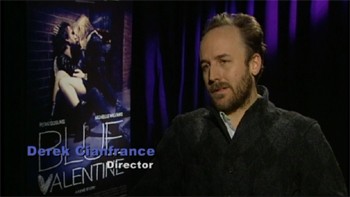 Commentary with Derek Cianfrance and Co-Editor Jim Helton:
Commentary with Derek Cianfrance and Co-Editor Jim Helton:
The director/editor pair reveals a lot about the conception and fleshing-out of Blue Valentine, taking a relaxed but deceptively revelatory tone. They reveal how the child actress who played Frankie helped to teach them how to shoot scenes involving children, lots of talk about cigarettes throughout, the focus on the music, and the scene that earned the film an NC-17 rating. They also candidly discuss the other scene that might've contributed at least a bit to it, the rough love-making scene, and reveal bits about the actors' performances in it. On top of that, they also discuss visual tone and the usage of Super16mm stock, coming together in a fairly in-depth and rather great track.
The Making of Blue Valentine (13:50, 16x9):
A typical press-kit blurb, this clip-heavy featurette closes in on expository interviews with the director and his actors, reflecting on motivations and the history of Blue Valentine's conception. The content's fine enough for a watch, with more clips from the film than tangible content to grasp at, but the bits that Cianfrance reveals about his connection with relationships and the impressions Williams and Gosling had over the material make it an intriguing listen.
Also included are a lengthy series of Deleted Scenes (19:44, 4x3 Letterbox) and the "Frankie and the Unicorn" Home Video (3:04, 4x3) in its completion.
Final Thoughts:
Blue Valentine is candid, extremely aware filmmaking that knows the anatomy of a failing relationship to a hitch, written with the adult brain in mind and painted with compelling artistic strokes. Two steady, strong performances from the leads -- especially from a powerhouse turn from Michelle Williams -- inform the film with authenticity, while shifting film styles and a moody rock soundtrack help guide their emotional transitions. It's a sad and painfully-realized story, there's not denying that, but there's also an inherent beauty within its blend of both hopefulness and hopelessness that shouldn't be denied. Anchor Bay's DVD arrives uncut and looking appropriate to the film's artistic intent, staggeringly so for a standard-definition presentation, and with a fine set of special features that include a clever director's commentary and some deleted scenes worth perusing. Very Highly Recommended.
Thomas Spurlin, Staff Reviewer -- DVDTalk Reviews | Personal Blog/Site

There's the urge to start a discussion about Blue Valentine by saying, "Everybody's gone through a soul-crushing end to a relationship". For some, Derek Cianfrance's deeply-felt indie drama will be a mirror; it's not likely to directly embody a real-life situation, but the framework and frank dialogue won't hesitate in striking a familiar chord with those who've fought similar battles and endured similar pains. Yet everybody hasn't crawled tooth-and-nail through a relationship like the one depicted here, where a change in mannerisms seemingly has no origin point, and the unhappy languor grinding between them becomes unbearable. It's honest, hard to watch, and seemingly futile as they spin their emotional tires, yet when you witness the memories built underneath them with convincing organic joy, you understand why it's not a useless battle -- and, in tandem, why it also is.
The script, written by Cianfranc, Cami Delavigne, and Joey Curtis, depicts a modern-day couple who have assuredly seen better days. It first focuses on a run-down version of Dean (Gosling), an easily-agitated housepainter who adores his daughter, Frankie. Then, our vision moves to his wife Cindy, the more responsible and mature of the two. She's a nurse at a local fertility clinic who appears exhausted and in full-on "mother" mode, while harboring off-put feelings towards her unmotivated, alcohol-fueled husband that don't make themselves readily apparent -- at least, not to him. Their demeanors immediately make us wonder what they might've seen in each other, in another time and another place, and how these two people got to a browbeaten state, populated with cold shoulders, questioning glances, and an utter lack of passion.
Blue Valentine answers that curiosity, in an artful and deeply-provocative fashion. It concurrently tells the story of how Dean, once a creative and musically-inclined professional mover, and Cindy, an edgy and sharp-tongued med-school student, meet by happenstance and fall in love at first sight -- at least, in Dean's case. But before it reaches this point, it also paints a portrait of the lives that these younger versions of the couple muscled through to get there, showing Dean's struggle with inexperience and a lack of high-school education, as well as Cindy's toils with a verbally-abusive father and a halfhearted relationship with a brutish sex-driven wrestler at her school. These moments merge with their modern-era frustrations and conflicts in a meaningful fashion, focusing closely on the way that their mannerisms have changed -- and stayed the same -- since their first real date.
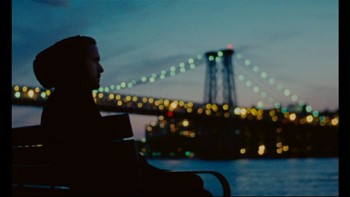 | 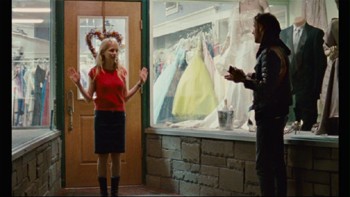 |
While the writing could've easily guided Blue Valentine towards melodramatic exertion, it simply doesn't go in that direction. The material here depicts a weathered couple who've been slowly dragged into the state of discontent that accompanies eking out a void make-it-work life, with Dean and Cindy suffering in their own ways. The depiction has a specific awareness of the adult psyche, giving the film a punchy, aching feeling amid their arguments -- one in particular over an ex-lover Cindy bumps into at a liquor store. Director Cinafranc thoroughly comprehends the emotional nature of adults, both in the self-conscious early moments of a relationship to the bitter desperation that comes with their last gasping breath, which he recreates in the two sides of the story. It's an emotional rollercoaster that attentively focuses on the spark of life within a relationship and the fading of said spark, and few films of recent have tapped into it with the depth, resolve, and conscientiousness as this one.
Cinematographer Andrij Parekh, who also shot Ryan Fleck's quietly cathartic Half Nelson, uses two separate film styles for the converging storylines: grainy film stock for the past shots, and crisp Red One HD footage for the other. The mix of sober clarity and wistful density juxtaposes the narrative veins in Blue Valentine, giving the past a consistency similar to old photographs, wedging them within the somber, clear footage much like the memories flashing in the couple's minds as an emotional backbone. Yet the memories they're seeing aren't mawkish kisses or saccharine forget-me-nots; they're levelheaded, authentically emotive displays that encapsulate both the warming and troubling moments of their relationship's conception, especially keen on their awkward yet magnetic first meeting, filled with ukulele music and tongue-tied stabs at humor while they coast along a train (One deadpan joke Cindy tells beautifully hangs in the air, while also revealing a great deal about both based on their reactions).
Much of the crisp modern-era content takes place in a "futuristic" hotel room that Dean drags an unenthusiastic Cindy to while she's on-call, a kitschy, raunchy spot with a rotating bed and neon pillars lighting the dining room. It sounds absurd and trite to drop them in a gaudy ultramodern spot made for carnal satisfaction -- rather bluntly framing the future Dean and Cindy in what they'll become -- and Derek Cianfrance shows no shame in using the setting in just that way; yet the way the glaring blue neon coats the couple, as they share drinks and meditatively dance to a familiar song, elevates these scenes into something powerful, disheartening, and visually quite alluring. More importantly, it also proves an ideal location for the soul-crushing conversation that the pair have over dinner, draping their embroiled facial mannerisms over talk of wasted potential and the need for family, in a light that suggests a level of passion that's shifting to distantness.
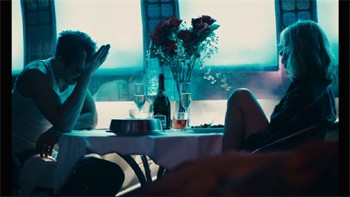 | 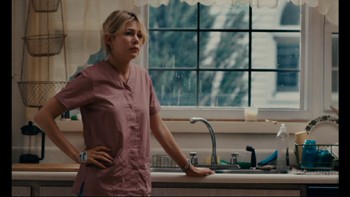 |
As well as Ryan Gosling handles Dean, with a gruff, earnest poise that lends him an air of genuineness, Cindy's the one that makes Blue Valentine. The experience in watching how the pair elevates and descends comprises the meat of the film, yet watching Cindy's manner change between her younger and older self sketches her into a vivid, uncompromising portrait of a trapped woman, one whom elicits both sympathy and a bit of scorn from the audience as she goes through rough events in her life. Cianfranc tries his damndest to make it as non-partisan of an exploration as he can, and Michelle Williams' performance ensures that we endure both sides of the emotional coin, surrendering to empathy for her past and realizing the path that's brought her to bitter, drained empathy in the present. Watching the flickers of each dance between the concurrent stories becomes a rather crushing, deeply-aware experience through Williams' performance.
By the end of Blue Valentine, you'll feel like you've been sent through the ringer: from a modern glimpse at fertility woes to the fabric of what encompasses a good father, husband, and partner worth staying with, Derek Cianfrance's raw heartache of a film never loses a grip on the maturity needed to make it feel legitimate, reminiscent of an updated take on John Cassavetes' oeuvre with its often discordant practicality. But even with its heavy nature, there's something undeniably poignant and, oftentimes, beautiful in the agonizing fabric it weaves around a couple falling out of love, and I found myself overwhelmed by the entire arc of Dean and Cindy's relationship. And in its very last moments -- where we witness the pinnacles of their relationship vying for attention in a blur of melancholy jumps between past and present -- it finds a note-perfect way of completing their heartache-addled journey, one likely to touch a nerve with anyone who's hit bottom in a relationship.
The DVD:
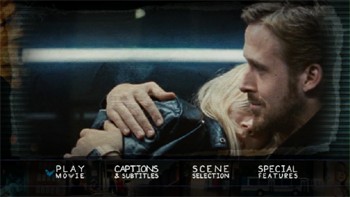 | 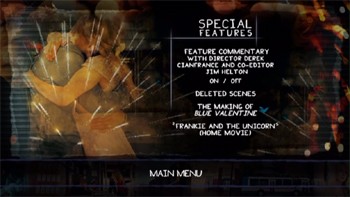 |
Blue Valentine arrives from Anchor Bay/The Weinstein Company with coverart that takes a spin on some of the theatrical poster artwork, with a semi-glossy slipcover replicating the front and back adorning it. The cut here is, in fact, the NC-17 "UNCUT" version of the film that runs 112 minutes, though the content that earns this marker really shouldn't raise any red flags over its luridness.
Video and Audio:
As previously mentioned, Blue Valentine was shot on both film stock and with Red One HD cameras, both encapsulated in Anchor Bay's widescreen-enhanced DVD at its correct 1.66:1 aspect ratio. Grain remains prevalent in the 16mm sequences, sporting the granulated contrast fades and slightly hazy detail expected, while it also captures the warmth in flesh tones to an earthy and, in some way, more natural degree than the alternate HD footage. Yet through the grain, it also grasps etched, focused textures in the print, such as Cindy's blonde hair and rough-fabric sweater, the links in a zipper and sheen in a leather jacket, and the perforation in bus seats and the strings in a ukulele. The high-definition footage has a crisper property, capturing the lush neon shades in the futuristic hotel and the close-ups in the scenes that focus on Cindy while she's driving. The key difference between the two resides in the temperature and texture of the sequences, warm and reminiscent in one and emotionally heavy and cool in the other, and this standard-definition image impresses in its digital stability and handling of the separate styles. Really impressive work.
Audio comes in a surprising Dolby Digital 5.1 track, one that reaches to the rear channels a lot more than expected. For a film of this type, this dynamism with birds chirping and the plucking of music to the rears isn't really necessary, but you'll find that the added gravitas created with those elements gives the film an earthier, almost radiant personality, even during its darker moments. And the rear usage can be rather full, too, belting out throaty musical cues and the echoes of sharp sound effects like shopping cart clangs and liquor bottle knocks. The main ingredient's the dialogue, remaining clear and well-balanced with an acute awareness of the surroundings -- the concrete walls of a gym,
Special Features:
 Commentary with Derek Cianfrance and Co-Editor Jim Helton:
Commentary with Derek Cianfrance and Co-Editor Jim Helton: The director/editor pair reveals a lot about the conception and fleshing-out of Blue Valentine, taking a relaxed but deceptively revelatory tone. They reveal how the child actress who played Frankie helped to teach them how to shoot scenes involving children, lots of talk about cigarettes throughout, the focus on the music, and the scene that earned the film an NC-17 rating. They also candidly discuss the other scene that might've contributed at least a bit to it, the rough love-making scene, and reveal bits about the actors' performances in it. On top of that, they also discuss visual tone and the usage of Super16mm stock, coming together in a fairly in-depth and rather great track.
The Making of Blue Valentine (13:50, 16x9):
A typical press-kit blurb, this clip-heavy featurette closes in on expository interviews with the director and his actors, reflecting on motivations and the history of Blue Valentine's conception. The content's fine enough for a watch, with more clips from the film than tangible content to grasp at, but the bits that Cianfrance reveals about his connection with relationships and the impressions Williams and Gosling had over the material make it an intriguing listen.
Also included are a lengthy series of Deleted Scenes (19:44, 4x3 Letterbox) and the "Frankie and the Unicorn" Home Video (3:04, 4x3) in its completion.
Final Thoughts:
Blue Valentine is candid, extremely aware filmmaking that knows the anatomy of a failing relationship to a hitch, written with the adult brain in mind and painted with compelling artistic strokes. Two steady, strong performances from the leads -- especially from a powerhouse turn from Michelle Williams -- inform the film with authenticity, while shifting film styles and a moody rock soundtrack help guide their emotional transitions. It's a sad and painfully-realized story, there's not denying that, but there's also an inherent beauty within its blend of both hopefulness and hopelessness that shouldn't be denied. Anchor Bay's DVD arrives uncut and looking appropriate to the film's artistic intent, staggeringly so for a standard-definition presentation, and with a fine set of special features that include a clever director's commentary and some deleted scenes worth perusing. Very Highly Recommended.
|
| Popular Reviews |
| Sponsored Links |
|
|
| Sponsored Links |
|
|
| Release List | Reviews | Shop | Newsletter | Forum | DVD Giveaways | Blu-Ray | Advertise |
|
Copyright 2024 DVDTalk.com All Rights Reserved. Legal Info, Privacy Policy, Terms of Use,
Manage Preferences,
Your Privacy Choices | |||||||









